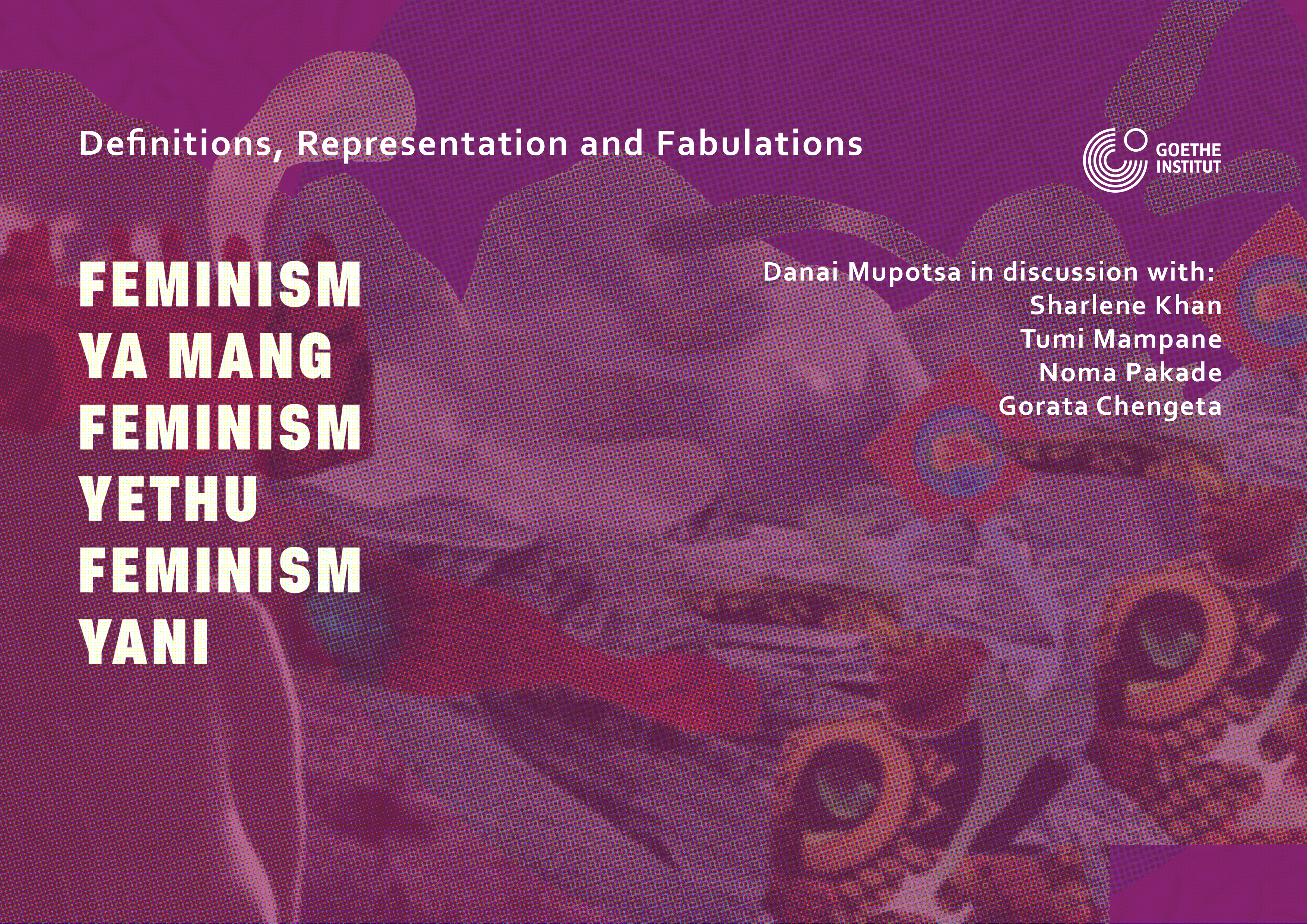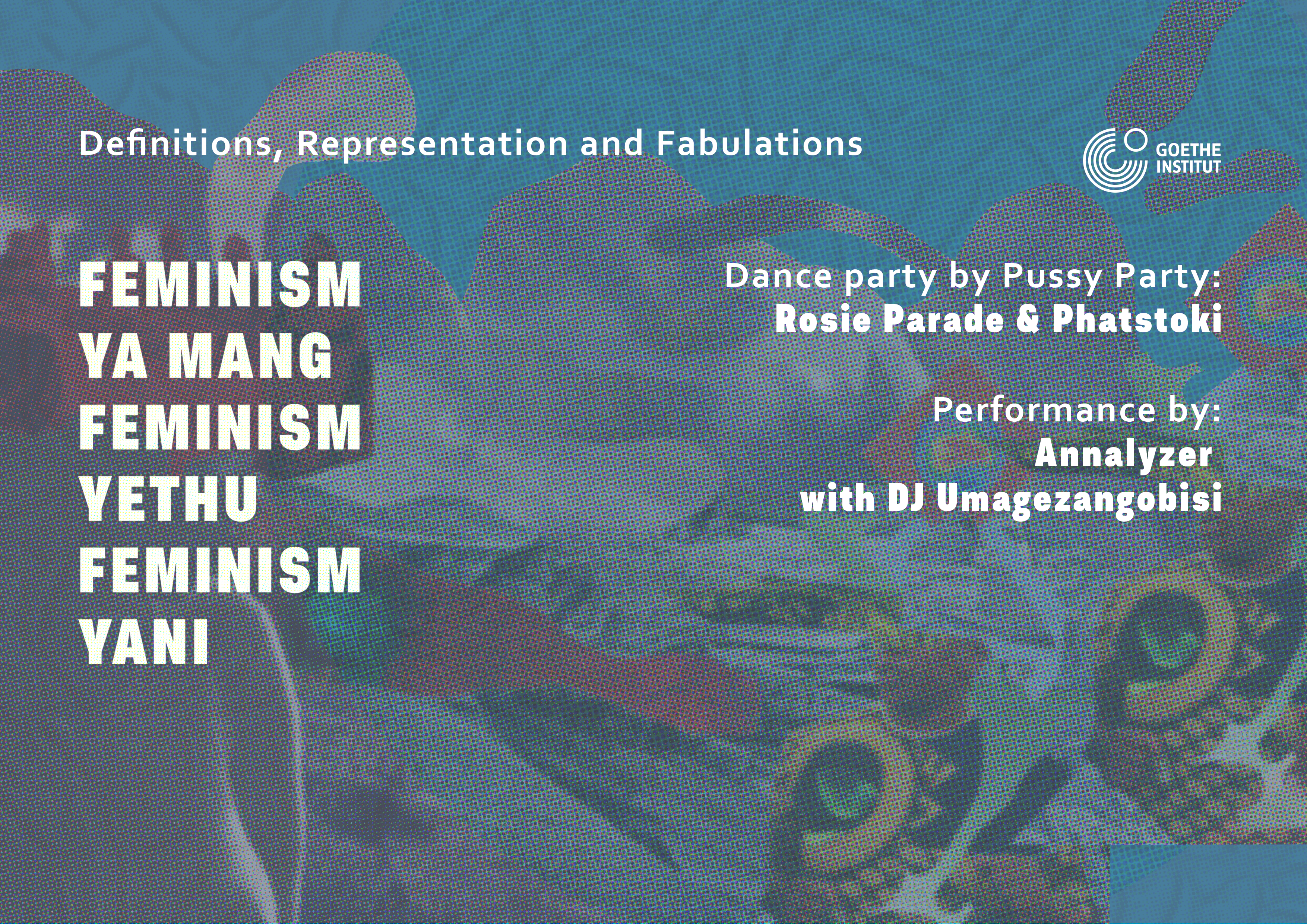“Feminism is a collective movement, not simply an isolated practice in which individual women engage, and thus a feminist conception of power must also include an account of solidarity”
Whose feminism? What feminism? Why feminism?
Those are the questions being asked and statements made through the collaborative project Feminism Ya Mang, Feminism Yethu, Feminism Yani, organised primarily in Johannesburg, South Africa. Funded by the Goethe Institut South Africa, the project “is an activation that builds on existing and ongoing conversations regarding women and our experiences in Southern Africa”. The project takes on artistic, sonic and scholarly endeavours such as organising exhibitions, holding panel discussions, a Pussy Party activation, as well as participating in the process of memory building — speaking back to the spaces that women have held thus far in the context of marginalisation in Southern Africa. It is even in the name, the multi-linguicism, an active choice in the inclusion of previously scarce languages in feminist discourse. “We aim to explore definitions, representations and fabulations of Mma, Mbokodo, MakoA, Sisi, our (She)been queens, hawkers, survivors, mamgobozi’s and all the sis buti’s who have had their experiences and voices be minimised to suit dominant and exclusionary narrative formations”, reads the project preface. And it continues:
It remains important that we are aware of the sensitivities around the topic and approach the process with the understanding that we are not the first or the last to have these conversations. We promise ourselves to tread thoughtfully and with as much insight rooted in the collaborators’ own experiences and that of family, colleagues, friends and trusted communities. The process of research was and is on-going.

This emphasis on community and collaboration is rooted in core feminist ethos. As the author, Audre Lorde says, “Without community there is no liberation”. The project which initially began in Kigali with Katharina Hey, is regionally facing in its nature. The rooted in South Africa — yet conscious of the construct and porous nature of borders — iteration of the project was conceptualised by Samantha Modisenyane and Masechaba Moloi in collaboration with Lindiwe Mngxitama, Dr. Danai Mupotsa and Motlatsi Khosi. “The project works with an awareness of the nuances of the nation-state as a context, while deeply aware of the ways the borders have always been porous and with an awareness of women’s statuses of movement and migration across our region.” Feminism Ya Mang, Feminism Yethu, Feminism Yani, will unfold through several happenings and activations, a methodology of form chosen to signal at the multiplicity of doing feminist work. Sometimes, what words cannot hold must be witnessed and felt, the exhibition component of Feminism Ya Mang, Feminism Yethu, Feminism Yani, titled Saloon | House of Empty’s, will go live on the Goethe’s Youtube page on Sunday May 16, however, bookings can be made to view it in person as walkabouts will be taking place every Friday until June 30. The naming of the exhibition, came from looking towards spaces of insurgent feminist work, often overlooked or simply not regarded as spaces of doing and holding feminist work — these spaces/homes as seen empty. However, here with this exhibition, these seemingly empty houses are honoured — along with those sacred femme spaces that hold our rituals of being made beautiful. The artists who make up the exhibition include: Teresa Firmino, Helena Uambembe, Amy Ayanda, Kelly Johnson, Lulama ‘Wolf’ Mlambo, Saaiqa, Santu Ramaisa, Jabu Nadia Newman and Jodi Bieber.
The exhibition is a reflection of the diversity of experiences and expressions in being woman in spaces such as those represented in this installation. ‘Home of Empty’s and Saloon’ explores the way in which woman engage with and exist within these realities. The installation texts particularly focuses on some of the words, emotions and memories associated with the spaces and interrogates what this means in a local context.

The panel discussion articulation of the activation will go live on Sunday May 23. Here, the project collaborators invited Sharlene Khan, Gorata Chengeta, Tumi Mampane and Nomancotsho Pakade to sit in conversation with Dr Mupotsa, engaging with and meditating on discourses, practices and histories of African feminism(s) that exist and “accounting for the various traditions, locations and registers we come from and read/ work through”. Feminist work is also embodied, we live feminist lives in these feeling, thinking and remembering bodies. However, our feminist experiences in these bodies are not just those of fighting against legacies of trauma, our feminist work is also takes shape in the space of pleasure, joy and ecstasy. The activation also includes a Pussy Party DJ set and performance by Annalyzer with DJ Umagezangobisi as sonic fabulations of the embodied ecstasies of doing feminist work. Feminism Ya Mang, Feminism Yethu, Feminism Yani, registers like a site of possibility through its many activations — all seeming to expand and create more room for how we think about and engage with feminism. It is textured with the specificity of memory, location, history and the multiplicity of embodied femme experiences. Feminism Ya Mang, Feminism Yethu, Feminism Yani; an offering. Feminism Ya Mang, Feminism Yethu, Feminism Yani, a process that seeks;
to pay tribute/homage to women seen and unseen, those remembered and those forgotten. Heard and unheard. A process of looking at the spaces we hold and how and why we hold these spaces, along with which spaces hold capacity or possibility….a celebration of our existence, in its many shades, shapes and forms: spiritually, physically, mentally and emotionally.
Follow Feminism Ya Mang, Feminism Yethu, Feminism Yani as it unfolds here!





















































